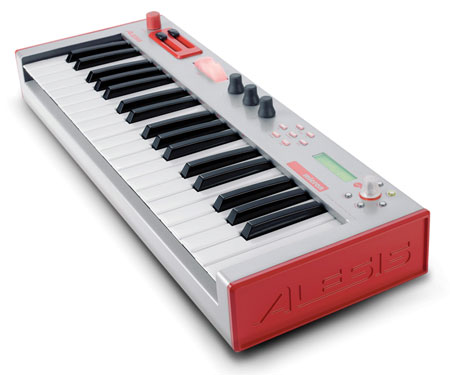Last year, before the holidays, I found a nice, massive keyboard sitting unloved at a thrift store. I assume it was still sitting there because anyone that tested it would have found it to be broken. I, however, am foolish enough to buy things without any consideration of functionality. So I brought this keyboard home, discovered it was broken, and proceeded to fix it up enough to make it work. And it’s been sitting in my closet ever since, waiting for its moment of glory.
On this most recent holiday, I saw something else at a thrift shop – a nice, tiny keyboard. The price was right, so I bought it – untested as is my way. As soon as I got the device to the car, I realized it was broken. One of the controller knobs was completely snapped off. Oh well. The price was right. Let’s get it home and see if it even powers up and makes noise.
I got it home and it powered up and made no sound. Well, it made a buzzing sound, sometimes. I started doing some online research and learned that this particular synth has a well known issue with that control knob failing (not sure if being broken off is considered “failing”). So replacements are generally easy to get. At this point, I don’t even know if that’s the actual problem. But let’s take a step back and look at this thing.

This little bugger is the Alesis Micron, which is an analog modeling synthesizer. It originally sold for $400 back in 2004. It still sells for about $200 on the used market. I got it for $7.50, half-off the original $15 price. So you see, it was worth the gamble. I’ve spent far more on far less (which should be my life’s motto).
When I saw “analog modeling synthesizer” on it, I got really excited. The only synth of that type I’d really known about before dropping out of the music scene was the Nord Modular, which I remember being a 4-figure keyboard. These types of keyboards emulate the older synths of the 70s and 80s. and they typically do it very well. They also have a lot of the features of older synths like arpeggiators (for playing Who Are You) and vocoders (for playing Mr. Blue Sky). There is a video on Youtube of someone playing Mr. Mister’s Kyrie live and solo on the Micron. But before I can have that kind of fun, this device needs repair.
I have a couple of options. I can just replace the knob (a potentiometer, if you want to sound cool), which requires some soldering work. The part costs less than $2 (plus shipping), and of course, I’ll need a new knob button to cap it off. Yeah, that’s one option, or I can buy a whole new control board with knob for $40. That’s the plug and play option and the one I opted for. That and the cap were about $50, so if this works out, I will have a really neat new synth for a little under $60. And then, it can sit in my closet, too. How stupid.
It is dumb, but I have a lot of fun rescuing junk and making it (or trying to make it) usable. I should consider myself fortunate this desire is just for musical equipment and not, say, cats.
The parts are currently being shipped and I should have them next week. Let’s hope I have as much success with this little Alesis as I did with the huge Alesis.






 On a regular CD shopping run last week, I picked up a random album. I didn’t know the artist, much less the album, but the name was intriguing: The Interstellar Suite By Amin Bhatia. Peeking inside the case, the liner notes stated: “The orchestral textures on this recording are a complex blend of synthesizers.” Well, consider me sold.
On a regular CD shopping run last week, I picked up a random album. I didn’t know the artist, much less the album, but the name was intriguing: The Interstellar Suite By Amin Bhatia. Peeking inside the case, the liner notes stated: “The orchestral textures on this recording are a complex blend of synthesizers.” Well, consider me sold.